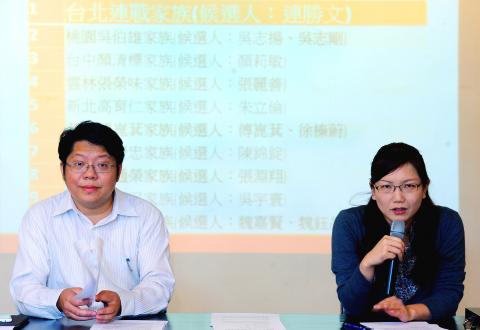The Lien family — which includes Chinese Nationalist Party (KMT) Taipei mayoral candidate Sean Lien (連勝文) and his father, former vice president Lien Chan (連戰) — finished first in a poll to pick the “top 10 dominant political families in Taiwan,” the Taiwan Inversion movement said yesterday.
The group announced the results at a Taipei news conference.
About 1,000 people participated in the survey from Nov. 2 to Sunday, with two-thirds of the participants voting online, and the rest casting their ballots at a rally held by several civic groups on Nov. 2.

Photo: Chang Chia-ming, Taipei Times
Respondents were asked to rank 22 families with a history of political involvement who also have members running for office in the Nov. 29 elections.
The Wu family — which includes Taoyuan County Commissioner John Wu (吳志揚), his brother, Taipei City Councilor Wu Chih-kang (吳志剛), and their father, former KMT chairman Wu Po-hsiung (吳伯雄) — was ranked second.
The Yen family from Greater Taichung was ranked third. It includes former Non-partisan Solidarity Union legislator Yen Ching-piao (顏清標); his son, Yen Kuan-heng (顏寬恒), who replaced him in a by-election after he was incarcerated for illegal gun possession and other charges; and his daughter, Yen Li-ming (顏莉敏), who is running in the Nov. 29 polls to succeed her brother.
Other families in the top 10 included those of former Yunlin County commissioner Chang Jung-wei (張榮味), New Taipei City Mayor Eric Chu (朱立倫) and Hualien County Commissioner Fu Kun-chi (傅崑萁).
Members of Taiwan Inversion said many other families held what they termed hereditary control over local politics through political factions, yet avoided media scrutiny because they were less well-known to the public.
“When political families gain hegemony in local politics, it is exceptionally difficult for young people with political ideals to compete with the abundant political resources of such families,” Taiwan Inversion member Urda Yen (嚴婉玲) said.
Yen cited the Wei (魏) family in Hualien, which was ranked No. 10, and has three brothers running for posts in elections. The family has a long record of vote-buying and other criminal charges, Yen said.
Regional political parties should be established so long-standing local organizations can participate in politics and receive subsidies, she said, adding that proportional representation should be used to elect city and county council members to ensure that candidates from smaller parties can be elected.
At a conference on electoral reform later in the day, Taiwan Citizen Union president Fan Yun (范雲) said the threshold for Taiwanese parties to receive public subsidies requires that they win 5 percent of the vote, but this should be lowered to 2 percent to aid smaller parties.
Sean Lien’s campaign spokesperson Chien Chen-yu (錢震宇) questioned the motive for conducting such a survey ahead of the elections.
“The issues that these groups are discussing do nothing to help the residents of Taipei,” Chien said. “We see the timing of such a news conference as an act of electoral maneuvering.”

MAKING WAVES: China’s maritime militia could become a nontraditional threat in war, clogging up shipping lanes to prevent US or Japanese intervention, a report said About 1,900 Chinese ships flying flags of convenience and fishing vessels that participated in China’s military exercises around Taiwan last month and in January last year have been listed for monitoring, Coast Guard Administration (CGA) Deputy Director-General Hsieh Ching-chin (謝慶欽) said yesterday. Following amendments to the Commercial Port Act (商港法) and the Law of Ships (船舶法) last month, the CGA can designate possible berthing areas or deny ports of call for vessels suspected of loitering around areas where undersea cables can be accessed, Oceans Affairs Council Minister Kuan Bi-ling (管碧玲) said. The list of suspected ships, originally 300, had risen to about

DAREDEVIL: Honnold said it had always been a dream of his to climb Taipei 101, while a Netflix producer said the skyscraper was ‘a real icon of this country’ US climber Alex Honnold yesterday took on Taiwan’s tallest building, becoming the first person to scale Taipei 101 without a rope, harness or safety net. Hundreds of spectators gathered at the base of the 101-story skyscraper to watch Honnold, 40, embark on his daredevil feat, which was also broadcast live on Netflix. Dressed in a red T-shirt and yellow custom-made climbing shoes, Honnold swiftly moved up the southeast face of the glass and steel building. At one point, he stepped onto a platform midway up to wave down at fans and onlookers who were taking photos. People watching from inside

Japan’s strategic alliance with the US would collapse if Tokyo were to turn away from a conflict in Taiwan, Japanese Prime Minister Sanae Takaichi said yesterday, but distanced herself from previous comments that suggested a possible military response in such an event. Takaichi expressed her latest views on a nationally broadcast TV program late on Monday, where an opposition party leader criticized her for igniting tensions with China with the earlier remarks. Ties between Japan and China have sunk to the worst level in years after Takaichi said in November that a hypothetical Chinese attack on Taiwan could bring about a Japanese

The WHO ignored early COVID-19 warnings from Taiwan, US Deputy Secretary of Health and Human Services Jim O’Neill said on Friday, as part of justification for Washington withdrawing from the global health body. US Secretary of State Marco Rubio on Thursday said that the US was pulling out of the UN agency, as it failed to fulfill its responsibilities during the COVID-19 pandemic. The WHO “ignored early COVID warnings from Taiwan in 2019 by pretending Taiwan did not exist, O’Neill wrote on X on Friday, Taiwan time. “It ignored rigorous science and promoted lockdowns.” The US will “continue international coordination on infectious